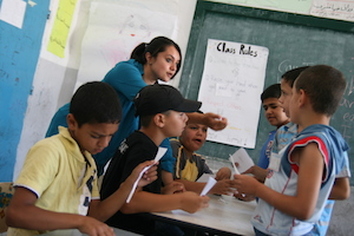|
Introducing Unipal
Unipal (Educational exchange with Palestinians since 1972) seeks to facilitate a two-way process of education; providing English-language teaching in Palestinian refugee camps in the West Bank (in the past, Gaza, Jordan and Lebanon) and introducing British students to a knowledge and understanding of the situation and daily lives of refugees. Unipal sends volunteers to the West Bank to run summer camps for children, teaching English and providing fun activities such as arts, crafts, music, drama and sports. Further English classes take place with older students supports students in West Bank universities with small grants while studying (organised through JAEP) in the past has had long term volunteers teaching students and adults in need of better English, and brought Palestinian teachers of English to the UK for short courses Palestinian Refugees During the Arab-Israeli war of 1948 over three-quarters of a million Palestinians fled or were driven from their homes in terror. They settled in refugee camps in Lebanon, the Gaza Strip, the West Bank, Jordan and Syria. Despite repeated UN resolutions appealing to Israel to allow the refugees to return to their homes, they have consistently been refused permission to do so. In 1950 the United Nations relief and works Agency for Palestinian Refugees (UNRWA) was established to organise the camps and meet the basic needs of the refugees. The scale of the task grew in 1967 when the Israeli occupation of the West Bank and Gaza Strip created a second wave of refugees. Today there are 3.25 million refugees registered with UNRWA, of whom 1.07 million live in 59 refugee camps characterised by chronic overcrowding and poverty. As refugees they have also suffered from extreme denial of human, civil and political rights, and often find themselves condemned to a future without hope and international concern. Despite the signing of the 1993 Oslo Peace Accord, the basic living conditions of the Palestinians have changed very little. |
The Importance of Education
Whether they live in the Occupied Territories or neighbouring Arab countries, Palestinian refugees are faced with tremendous obstacles in breaking out of the cycle of deprivation and despair. Finding employment and being able to support themselves and their families is their greatest ambition, and depends upon adequate educational provision. Palestinians need good English for skilled jobs, to enter university and to communicate with the outside world. Children learn English in Palestinian Authority and UNRWA schools but class sizes are often large. Unipal classes enable students to learn with native speakers. Unipal and Education Unipal was formed in 1972 by Eleanor Aitken, herself a language teacher, who on a journey through the Middle East was shocked at the plight of the Palestinian refugees. Since then a total of over 700 Unipal volunteers have run summer teaching projects with refugee children in the camps. Over 30 long-term volunteers have worked for a year or more teaching in the Occupied Territories and Lebanon, and over 60 Palestinian teachers of English have been brought to Britain for intensive language courses. While British volunteers have had a unique opportunity to learn at first hand about the Palestinians’ history, culture and present circumstances, Palestinian teachers have been able to live the language that they teach. The process of exchange brings human warmth and personal experience to the mutual benefit of learning. How you can help Unipal is a registered charity which is dependent on donations and volunteers. If you would like to make a donation or set up a Standing Order, please write to us at the address given on the Apply page. If you are interested in volunteering or know someone who might make a good candidate, please refer to the VOLUNTEERING page. |


